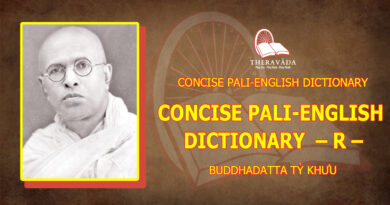THE CONCEPT OF PERSONALITY REVEALED THROUGH THE PANCANIKAYA – PREFACE
THE CONCEPT OF PERSONALITY REVEALED THROUGH THE PANCANIKAYA – PREFACE
PREFACE
Buddhism is often understood as a religion or an ethical way of life for the Buddhists. Not so many articles consider it as a way of education. Even in a very well-known educational work entitled “Theories of Personality” by Calvin S. Hall and Gardner Lindzey, published in 1991, 3rd Edition, there is only one new chapter on “Eastern Psychology” discussing Abhidhamma, in sixteen pages, as an Eastern personality theory. In this research work, the author has made an attempt to present Lord Buddha’s teachings recorded in the Pali Suttapitaka as a theory of personality on which a new course of education or culture may be based. The author began his work from the starting point of the current crises of human society, then came to Lord Buddha’s concept of personality, then to the solutions for those crises. The author was aware of difficulties that he would come across during the period of proceeding with the work, but under the kind and interesting supervision and encouragement from his supervisor, Dr. Bhikshu Satyapala, he worked on the chosen topic, “The Concept of Personality revealed through the Pancanikaya”, with confidence, especially after the topic was admitted by The Board of Research Studies for the Humanities, Delhi University, through its meeting held on February 16, 1994.
The author has divided his research work into five parts:
- Introduction of the topic.
2. Dependent Origination as the Noble Truth.
3. The Concept of Personality revealed through the Pancanikaya.
4. Five Aggregates and Individual problems.
5. Conclusion: A new course of education or culture, and solutions for the current crises.
The author does not mention a human being as an entity having a permanent nature, but as a conditioned existence or a process of becoming. In doing this, the author has a hope that this research work will present something interesting to the world of education.
On the completion of this work, the author would like to express his sincere gratitude to Dr. K.T.S. Sarao, Head of the Department of Buddhist Studies, Delhi University, who gave him kind advice, to Dr. Reader, Bhikshu Satyapala who kindly supervised the whole work to its completion. He would also like to express his sincere gratitude to other Professors, Readers and Lecturers of the Department of Buddhist Studies.
He is also extremely grateful to the I.C.C.R. of the Indian Government for granting him a scholarship for M. Phil. and Ph.D. Studies, to Vietnamese Government for giving him permission to go to Delhi to pursue research in Buddhist Studies, and to Dr. Bhikkhu THICH MINH-CHAU, the Rector of the Vietnam Buddhist Research Institute, who always encouraged him to think of a Buddhist way of Education.
Last but not the least, the author does not fail to express here his gratitude to those whose works proved very useful source of reference for his Thesis.
Bhikkhu THICH CHON-THIEN (NGUYEN HOI)
Department of Buddhist Studies
University of Delhi, Delhi – 110007, India
1995









